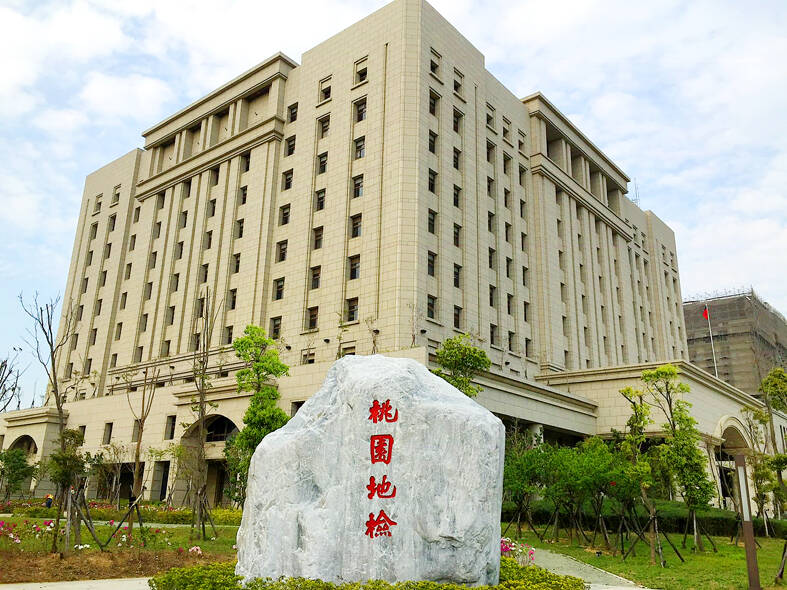The Taoyuan District Prosecutors’ Office has indicted a man on suspicion of stealing NT$1.944 billion (US$59.6 million) in trade secrets from his former employer and contravening the Trade Secrets Act (營業秘密法).
The man, a 60-year-old surnamed Tsou (鄒), is suspected of having copied and taken possession of 5,681 confidential HCM Co business files on the company’s materials, processes, designs and equipment development, the prosecutors’ office said in a statement on Monday.
Although the indictment covers only the theft of the secrets, prosecutors said that they were worth NT$1.944 billion and caused the company substantial losses, without explaining how they arrived at the figure.

Photo: Yu Jui-jen, Taipei Times
Prosecutors said that Tsou traveled to China with the head of a Chinese company, and they were investigating if and where he might have leaked the information.
HCM is a Taiwan-based lithium battery material supplier specializing in lithium manganese iron phosphate (LMFP) production, a key material used for electric vehicles, the company’s Web site says.
HCM is the first company in the world to mass-produce LMFP and the only cathode material factory that has equipment development capabilities and material research and development capabilities, the Web site says.
Tsou was employed at the company as a project manager in September last year. He tendered his resignation at the beginning of December and agreed to stay until the end of the month, prosecutors said.
However, he overstepped his authority, accessing the confidential files and copying them on to flash drives and hard drives from Dec. 8 to Dec. 26, they said.
HCM only became aware that its secret files had been copied and stored externally after Tsou left the company, and reported the case to prosecutors.
On April 29, prosecutors led the Taoyuan branch of the Ministry of Justice’s Investigation Bureau in a raid of the suspect’s residence and seized his flash drives and hard drives, prosecutors said.
Tsou was questioned and held in custody, they said.
Prosecutors said that Tsou contravened the Trade Secrets Act and his actions hurt the development and competitiveness of Taiwan’s high-tech industry, adding that they recommended he be given a heavy sentence.

SHIPS, TRAINS AND AUTOMOBILES: The ministry has announced changes to varied transportation industries taking effect soon, with a number of effects for passengers Beginning next month, the post office is canceling signature upon delivery and written inquiry services for international registered small packets in accordance with the new policy of the Universal Postal Union, the Ministry of Transportation and Communications said yesterday. The new policy does not apply to packets that are to be delivered to China, the ministry said. Senders of international registered small packets would receive a NT$10 rebate on postage if the packets are sent from Jan. 1 to March 31, it added. The ministry said that three other policies are also scheduled to take effect next month. International cruise ship operators

HORROR STORIES: One victim recounted not realizing they had been stabbed and seeing people bleeding, while another recalled breaking down in tears after fleeing A man on Friday died after he tried to fight the knife-wielding suspect who went on a stabbing spree near two of Taipei’s busiest metro stations, Taipei Mayor Chiang Wan-an (蔣萬安) said. The 57-year-old man, identified by his family name, Yu (余), encountered the suspect at Exit M7 of Taipei Main Station and immediately tried to stop him, but was fatally wounded and later died, Chiang said, calling the incident “heartbreaking.” Yu’s family would receive at least NT$5 million (US$158,584) in compensation through the Taipei Rapid Transit Corp’s (TRTC) insurance coverage, he said after convening an emergency security response meeting yesterday morning. National

The Forestry and Nature Conservation Agency yesterday launched a gift box to market honey “certified by a Formosan black bear” in appreciation of a beekeeper’s amicable interaction with a honey-thieving bear. Beekeeper Chih Ming-chen (池明鎮) in January inspected his bee farm in Hualien County’s Jhuosi Township (卓溪) and found that more than 20 beehives had been destroyed and many hives were eaten, with bear droppings and paw prints near the destroyed hives, the agency said. Chih returned to the farm to move the remaining beehives away that evening when he encountered a Formosan black bear only 20m away, the agency said. The bear

PLANNED: The suspect visited the crime scene before the killings, seeking information on how to access the roof, and had extensively researched a 2014 stabbing incident The suspect in a stabbing attack that killed three people and injured 11 in Taipei on Friday had planned the assault and set fires at other locations earlier in the day, law enforcement officials said yesterday. National Police Agency (NPA) Director-General Chang Jung-hsin (張榮興) said the suspect, a 27-year-old man named Chang Wen (張文), began the attacks at 3:40pm, first setting off smoke bombs on a road, damaging cars and motorbikes. Earlier, Chang Wen set fire to a rental room where he was staying on Gongyuan Road in Zhongzheng District (中正), Chang Jung-hsin said. The suspect later threw smoke grenades near two exits